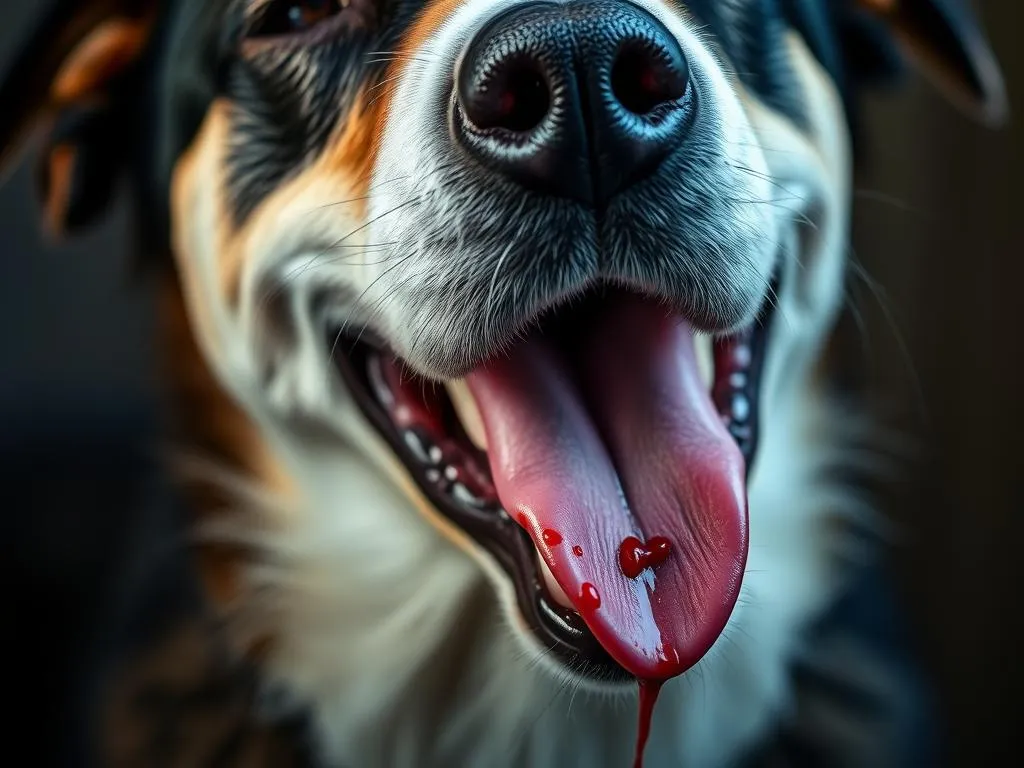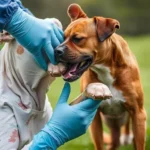
Understanding your dog’s behavior can be a complex journey, especially when it involves unusual actions like licking blood. This behavior can raise numerous questions for pet owners, from concerns about health to worries about instinctual behavior. In this comprehensive guide, we will delve into the reasons why dogs lick blood, exploring instinctual, medical, and behavioral factors while offering tips for identifying underlying causes, managing the behavior, and ensuring your pet’s overall health.
Understanding Canine Behavior
Basic Canine Instincts
Dogs are creatures of instinct, with behaviors deeply rooted in their evolutionary history. Their ancestors, wolves, relied on their instincts for survival, which influenced many of the behaviors we observe in domestic dogs today. Canine instincts dictate a dog’s need for grooming, which includes licking. This behavior serves not just for cleanliness but also for comfort and bonding.
When Is Licking Normal?
Licking is a normal behavior in dogs, often seen in various contexts. Dogs may lick themselves, their owners, or even objects in their environment. This can be a form of affection, a method of self-soothing, or simply a way to explore their surroundings. However, it’s crucial for pet owners to differentiate between normal licking and behaviors that may indicate underlying issues, especially when it involves licking blood.
Why Do Dogs Lick Blood?
Instinctual Reasons
Dogs have a heightened sense of taste and smell, which can drive them to explore substances that may be unfamiliar or interesting to them. From an instinctual perspective, licking blood may harken back to their scavenging days when blood indicated a potential food source. This behavior can be traced back to survival instincts, where the ability to identify and consume nutrients was essential.
Medical Reasons
While some licking behaviors are instinctual, it’s vital to consider potential health issues that might lead a dog to lick blood. Some common medical reasons include:
- Wounds or injuries: If a dog sustains an injury, they may lick the wound to clean it or due to the taste of blood.
- Skin conditions: Allergies, infections, or irritations can prompt excessive licking, leading to the exposure of blood.
- Dental problems: Oral health issues can cause bleeding gums or injuries, leading dogs to lick their mouths and the blood that may result.
Understanding these medical reasons is crucial for pet owners who notice their dogs licking blood, as it may be indicative of a more serious health concern.
Behavioral Reasons
In some cases, licking blood can be attributed to behavioral issues. Stress and anxiety can manifest in various ways, including licking. Dogs may lick blood as a coping mechanism when they are feeling anxious or stressed. Additionally, this behavior can sometimes be attention-seeking; if a dog realizes that licking leads to interaction with their owner, they may repeat the behavior.
Compulsive disorders can also play a role. Dogs may develop habits of excessive licking, which could include licking blood or wounds, as part of a larger pattern of compulsive behavior. Identifying these behavioral factors is essential for effective management and treatment.
Identifying the Underlying Cause
Observing the Behavior
To address the issue of why dogs lick blood, pet owners should closely monitor their dog’s behavior. Pay attention to when and where the licking occurs, as well as any accompanying signs that may indicate distress or discomfort, such as whining, excessive panting, or restlessness. Keeping a diary of these occurrences can help identify patterns and triggers.
When to Seek Veterinary Help
Certain indicators suggest that licking blood is a serious concern, warranting immediate veterinary attention. If your dog is licking blood frequently, seems to be in pain, has visible wounds or lesions, or shows other signs of illness, it’s essential to consult with a veterinarian promptly. Early intervention can prevent more severe health issues down the line and ensure your dog receives the care they need.
Preventing and Managing Licking Behavior
Regular Health Check-ups
Routine veterinary visits are critical for maintaining your dog’s health. Regular check-ups can help catch potential health issues before they escalate, allowing for timely treatment. Ensure your dog receives appropriate vaccinations, preventive care, and dental check-ups, as oral health can significantly impact overall well-being.
Creating a Healthy Environment
A dog’s environment plays a crucial role in their mental and emotional well-being. Providing a safe, stress-free home can help alleviate anxiety-related licking. Incorporate plenty of physical exercise and mental stimulation into your dog’s daily routine. Activities such as walks, playtime, and puzzle toys can keep your dog engaged and reduce the likelihood of compulsive behaviors.
Training and Behavioral Modification
If licking is identified as a compulsive behavior, training may be necessary. Positive reinforcement techniques can be effective in redirecting your dog’s attention away from licking. Reward your dog for engaging in alternative behaviors, and provide distractions, such as toys or games, when they seem inclined to lick excessively.
Treatment Options
Veterinary Interventions
When licking blood is due to an underlying medical issue, your veterinarian will recommend appropriate treatments based on the diagnosis. This may include medications for infections, anti-inflammatory drugs for pain relief, or topical treatments for skin conditions. It’s essential to follow your veterinarian’s recommendations closely to ensure a full recovery.
Home Remedies and Care
For minor injuries or skin irritations, there are safe home remedies that can help. Clean the affected area gently with warm water and mild soap, avoiding any harsh chemicals. Natural supplements, such as omega-3 fatty acids, can also promote skin health and reduce inflammation, but always consult your veterinarian before introducing new supplements to your dog’s diet.
Conclusion
Understanding why dogs lick blood is crucial for every pet owner. This behavior can stem from instinctual drives, medical concerns, or behavioral issues. By observing your dog’s behavior, seeking veterinary help when necessary, and creating a healthy environment, you can effectively manage this behavior and promote your dog’s overall health. Staying informed and proactive about your dog’s well-being will not only enhance their quality of life but also strengthen the bond you share.
FAQs
Common Questions About Dogs Licking Blood
What should I do if my dog licks blood?
If your dog licks blood, first determine the source. Check for visible wounds or injuries and monitor their behavior. If the licking persists or if you notice concerning symptoms, consult your veterinarian for guidance.
Is licking blood a sign of a serious problem?
Licking blood can indicate a serious issue, especially if it is frequent or accompanied by other signs of distress. Always consider a veterinary consultation if you have concerns.
How can I tell if my dog is in pain?
Signs that your dog may be in pain include whimpering, reluctance to move, changes in appetite, excessive licking or grooming, and changes in behavior. If you notice any of these signs, it’s crucial to consult your veterinarian for a thorough evaluation.









